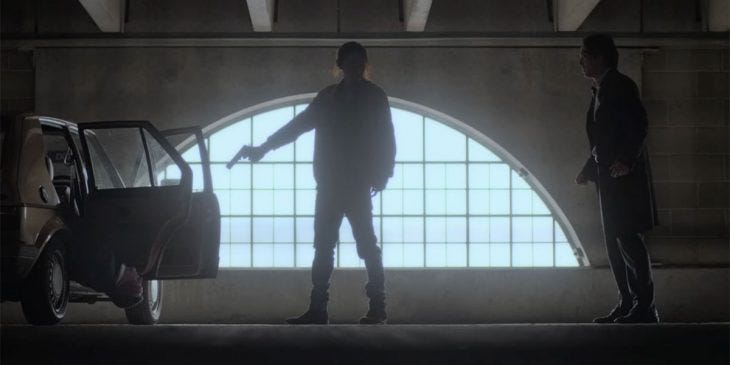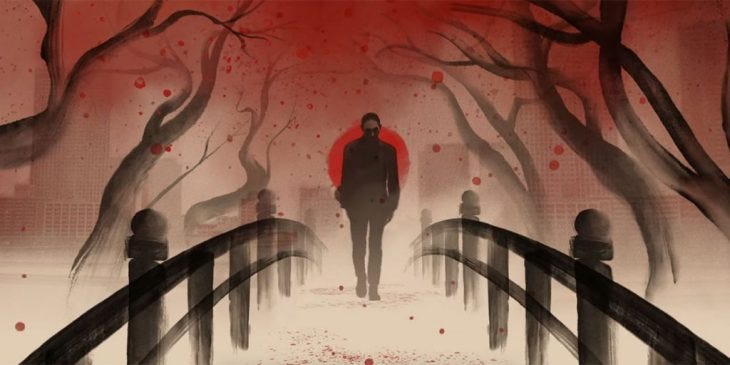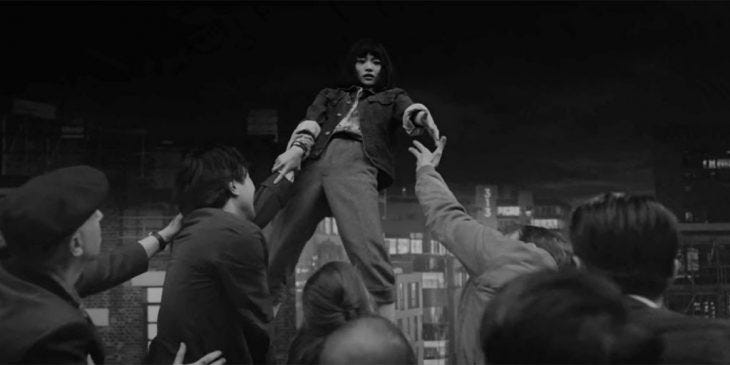Rarely do I come across a TV series bursting with an amazing amount of artistry. From the acting to the visuals to the dialogue to the story, Giri / Haji was so good I didn't have the words to praise it. I just kept mumbling, "Oh, my God, oh, my god, it's so good... so good..."
After a while, I felt like an idiot as I kept repeating those words. So useless. Sometimes, speechlessness is the best praise. But, you know, three days after I finished all eight episodes, I found my tongue again, so to speak.
It won't be right to begin by saying, "Giri / Haji" is about... About what? Giri / Haji is about so many things. So many life stories that intersected after a single murder, like ripples from a single stone thrown into a pond, as one character so aptly put it.
Kenzo Mori
In London, a young Japanese man has just come home to his posh apartment. The intercom buzzes, he greets the visitor and, as he waits for him to go up, he pours two drinks.
In a split second, the apartment is transformed into a crime scene. The forensic team in their white suits are dusting for fingerprints and taking photos. The young man is on the floor on his belly with a sword sticking from his spine.
In a Tokyo restaurant, a photo of the dead man is in front of a diner. Shots are fired, and the diner along with everyone inside the restaurant is dead.
Not long after, Kenzo Mori (Takehiro Hira) of the Tokyo Police Department is visited by the gang lord Fukuhara who tells him that the young man murdered in London, Saburo Endo, was the nephew of a rival gang lord and was killed with his family sword that was stolen a year earlier by Yuto (Yōsuke Kubozuka), Kenzo's younger brother, and former employee of Fukuhara.
A gang war was imminent. Kenzo is sent to London as a foreign exchange student to find Yuto, presumed dead for a year, and bring him back to Japan.
Yuto Mori
In London, Kenzo meets his teacher, Sarah Weitzmann (Kelly MacDonald) and makes the acquaintance of Rodney (Will Sharpe), a half-Japanese male prostitute and drug addict.
Following a lead, Rodney brings Kenzo to Momo Club.
Kenzo: "Does a man called Yuto Mori come in here?"
Bartender: "No."
Kenzo: "What about Saburo Endo?"
Bartender (addressing a cutsomer): "Hisateru, didn't you know a guy called Saburo?"
Hisateru: "That's right."
Kenzo: "You know he was murdered?"
Hisateru: "That doesn't surprise me."
Kenzo: "Why?"
Hisateru: "He was an asshole."
Kenzo: "There's a rumor that it was the Yakuza."
Bartender: "There are no Yakuza in London."
Hisateru: "No. There's one."
Hisateru: "He was a hitman for a major crime family. But he got thrown out. Left Japan in disgrace. Washed up here. Became an alcoholic, almost drank himself to death. Then, one night, he was in a bar alone when a man burst in. The man was going to be killed. So, the Yakuza evened the odds. He didn't know it, but he'd saved the life of one of the most feared gangsters in London. And the gangster didn't know it, but he'd just hired the most deadly assassin in Japan."
Kenzo: "Have you ever met that Yakuza?"
Hisateru: "You don't see him. And you better hope he never learns your name."
All that in Episode 1. And that story of Yuto, told with that stunning animation, made him out like a ghost of legendary proportions. I was reminded of the way Verbal Kint told the story of Keyser Söze (The Usual Supects, 1995) and the animation was reminiscent of how Xenophilius Lovegood told the tale of the Deathly Hallows.
And so, I watched. For two nights. And what I thought was a promise of a good show in Episode 1 turned out to be more than a promise. By the time I finished all eight episodes, Giri / Haji had exceeded all my expectations.
Giri / Haji is more than a ganster tale
Yes, there is plenty of graphic violence. And some nudity. And drug abuse. But Giri / Haji is more than about gangsters and the seedy underbelly of London and Tokyo. Without detracting from the story of Kenzo and Yuto, and their precarious relationship, there are the lives of their family, their own personal relationships and the lives of everyone they touched.
The dialogues are written in simple language even when they turn philosophical, as when Sarah muses while smoking a joint.
Do you ever think that everything we do is an echo of something? Like how everything we've done is going to happen again, and everything we're going to do has already happened somewhere else. And we're all just dancing around each other like atoms, and we can't even stroke a hair from our face without it affecting the lives of a billion people. Like how every tiny split-second decision we make can potentially have a vast, profound effect on everyone around us. Or maybe it's all planned...
And the visuals are so dreamy. There is a dance sequence toward the end of the final episode that was as unexpected as it was captivating in its emotional intensity.
But I'm rambling on and I really don't mean to want to spoil it for those among you who haven't seen it. So, just go and watch Giri / Haji. It is proof that multi-million-per-episode budget is not a requirement to come up with a good show.





